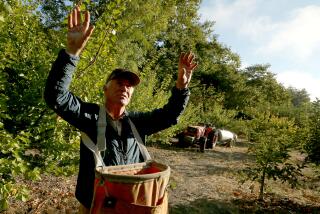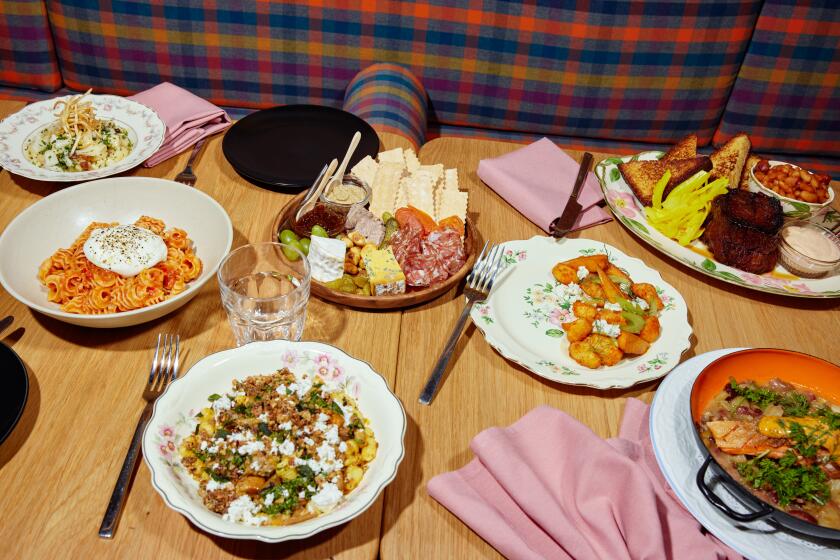Wax apples come to Temple City, Pasadena farmers markets
- Share via
In a hardscrabble district of South El Monte, near a decommissioned missile site, tucked away behind a warehouse filled with Chinese sunglasses, lies a secret orchard bearing a rare and mysterious Asian fruit. It’s the work of a wealthy Taiwanese man, Lung Ke Wu, who drilled holes in the asphalt to plant his own paradise and who is now causing jaws to drop when he sells the fruit, called wax apples, at farmers markets.
“Wax apples are common in Taiwan, but I’m very surprised to see them sold here,” said Sue Lee of San Marino, a shopper at the Temple City farmers market.
“I’ve been looking for this fruit for 30 years,” gushed Karla M. Alvarado on the Pasadena farmers market Facebook page. “I last had it as a kid in Nicaragua!!”
The fruit, which really looks like it is made of wax, is glossy pink and pear-shaped, with fleshy lobes at the bottom. Beneath its thin, delicate skin is crisp but oddly spongy, juicy white flesh containing one or two small seeds. The flavor, slightly sweet and tart, is very mild — most Westerners would say insipid — but Asians prize the fruit for its refreshing qualities.
Native to Malaysia and Southeast Asia, wax apple (Syzygium samarangense) is in the myrtle family and kin to guava, which it vaguely resembles. It is generally considered the best of five similar commonly cultivated species, including jambolan, water apple, rose apple and Malay apple, which are sometimes confused with one another.
Wax apple is also called wax jambu, Java apple and many other names. It is grown in home gardens around tropical Asia and Central America, and cultivated commercially in Thailand, but it is most important in southern Taiwan, where farmers have developed superior varieties and horticultural practices to aid in its production. The fruits are mainly eaten fresh but are also used in fruit salads (rujak) and pickled in Indonesia and Malaysia.
Wax apple can host exotic fruit flies, so agricultural regulations prohibit its importation into the United States. The only commercial plantings on the domestic mainland are in Florida, although less than 20 acres are grown there. Asian groceries in Southern California do occasionally carry wax apples from backyard trees.
One reason wax apples have not been more widely cultivated is that the fruits are highly perishable, and keep just a few days at room temperature. They are sensitive to cold, so when refrigerated they decay even more quickly.
Born 73 years ago in Taiwan, Wu worked for his government for four decades as a farm advisor, in Ivory Coast and El Salvador. (At the time the Taiwanese government was trying to secure support in its struggle with mainland China for recognition by other countries.) He met his wife, Inez, in El Salvador. Later he immigrated to California and prospered by importing sunglasses.
About a decade ago he planted 25 wax apple trees behind the warehouse; he also put in a row of more conventional fruit trees, such as apple, Asian pear and peach, along a wall flanking the structure. The wax apple trees, protected against winter cold by surrounding walls and the cement floor, are now lush and seven feet tall, and starting to bear copiously. The season is July to November, says Wu, whose surname, appropriately, is part of the Chinese term for wax apple, lian wu. (Some nurserymen and home gardeners say that in Southern California there are naturally two seasons for wax apples, one now and another in late fall.)
Wu also farms several extensive yards behind his and nearby homes in Arcadia, growing Asian vegetables like long beans, chayotes, bamboo shoots and winter melons. Vegetable buyers throng his largest stand, at the Temple City farmers market, which is held every Sunday from 8:30 a.m. to 12:30 p.m. in the parking lot between City Hall and Temple City Park. At Wu’s other two venues, the Pasadena Victory Park and Playhouse District farmers markets, he mostly sells wax apples.
More to Read
Eat your way across L.A.
Get our weekly Tasting Notes newsletter for reviews, news and more.
You may occasionally receive promotional content from the Los Angeles Times.










